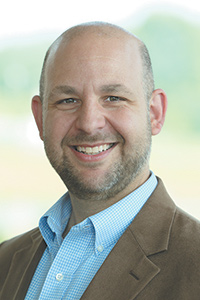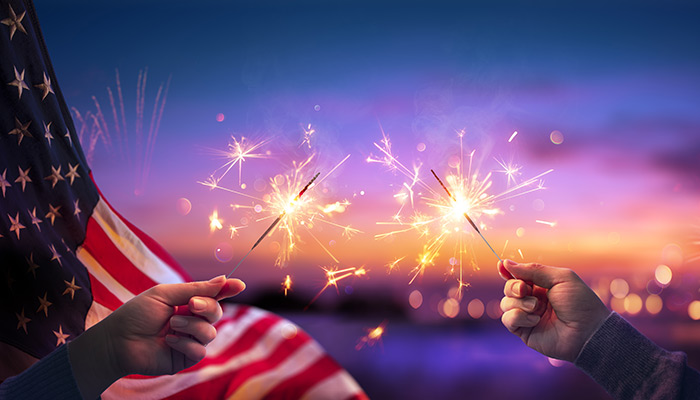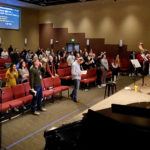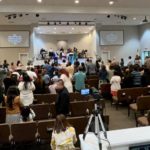

FRANKLIN, Tenn. (BP) — Independence Day is this weekend, and this year’s patriotic holiday is unique: for the first time in eleven years, the 4th of July will fall on a Sunday.
Southern Baptists will choose to gather on this Lord’s Day in different ways. Some will hold festive patriotic celebrations, but others will opt for more typical worship gatherings. Most will find middle ground somewhere between these two poles.
My aim here isn’t to endorse one approach over another. But I do wonder: Are there any points on which Southern Baptists can all agree when it comes to our 4th of July worship gatherings?
I certainly can’t speak on behalf of Southern Baptists, but here are some ideas that occurred to me as I pondered this question.
The focus of our worship is the Triune God of the Universe. On Independence Day, or any Lord’s Day, we mustn’t lose sight of the principal reason for our gathering. Even if we choose to include additional elements, God’s story—who He is and what He has done—must be featured. If an attendee leaves our worship service declaring, “Wow, what a country!” rather than “Oh, what a Savior!”, we’ve missed the mark.
We should sing hymns and worship songs more passionately than our national anthems. What picture do we paint—even if unintentionally—when we raise our voices with pride, and even shed a few tears, as we sing “The Star-Spangled Banner,” but we half-heartedly mutter the songs of our faith. May our patriotic fervor never outshine our biblical acts of worship.
Our ultimate pledge of allegiance is to Christ. It is customary to pledge faithfulness and devotion to people (like our spouses) and institutions (like our nation). But our loyalty to Christ must transcend these earthly pledges. Jesus is Lord, and every other commitment is subordinate to His rule and reign.
Our nation and its leaders need our prayers. Whether or not your choice for president is currently in office, Paul exhorts us to offer “petitions, prayers, intercessions, and thanksgivings” for our leaders. When you love them, pray for them. When you dislike them, pray anyway. May our adherence to biblical commands always outweigh our political affiliations.
We should long for a better government. The inadequacies of every human leader should kindle our longing for the King of Kings and Lord of Lords, the only one who will rule with perfect justice and righteousness, of whose reign “there will be no end.” Even so, Lord Jesus, come quickly!
We should crave a superior country. The United States pales in comparison to the country for which we were created. As we grieve the sin and hurt so prevalent in our nation, we should find hope in God’s promise of a forever kingdom where there will be “no more sickness, nor pain, nor dying.” As we memorialize the soldiers who’ve fought on our nation’s behalf, we delight in the day that swords will be turned to ploughshares as the Prince of Peace reigns supreme. So, even as we acknowledge our current homeland, our prayer should always be: “Thy kingdom come,” as we long expectantly for Christ’s return.
The preeminent symbol is still the cross. The American flag may be, as the old song depicts, a “grand old flag,” but only the cross of Jesus is the “power of God to us who are being saved.” If you honor the American flag in your worship service on Sunday, July 4—or if you don’t—remember the only symbol that communicates the story of a spotless Lamb who paid the price for humanity’s sins, taking our curse, and receiving the wrath we deserve: the cross of our Lord and Savior Jesus Christ.
Patriotic celebration should be accompanied by lament and confession. We may celebrate the United States as the “land of the free and home of the brave,” but we should grieve that our nation is the “land of abortion on demand.” Likewise, we can cheer the positive impact Christians have had on our country, while simultaneously acknowledging our imperfect past and confessing our present failures. Authenticity and honest evaluation of any setting demands recognition of both successes and failures.
Our love of nation should stimulate our love of “the nations.” It’s proper to love and desire God’s blessing on the national setting in which He has providentially placed us, but our Commission is for “every nation, tribe, people and language.” My love for a fellow citizen should not be greater than my love for a Chinese brother or sister in Christ. My concern for the lost soul of my neighbor across the street should not overshadow my distress for my lost neighbor across the ocean.
The only way to become a citizen of God’s kingdom is to be born again. Beyond every message we proclaim on July 4, 2021, our attendees need to hear (and hear featured) the Gospel of our Lord and Savior Jesus Christ.
Churches across America will gather on July 4, 2021. Regardless of your church’s approach to worship on Independence Day, may we find unity as we strive together to reach others with the Gospel of Jesus Christ and strengthen the discipleship of those who gather together weekly in our Southern Baptist churches.





















